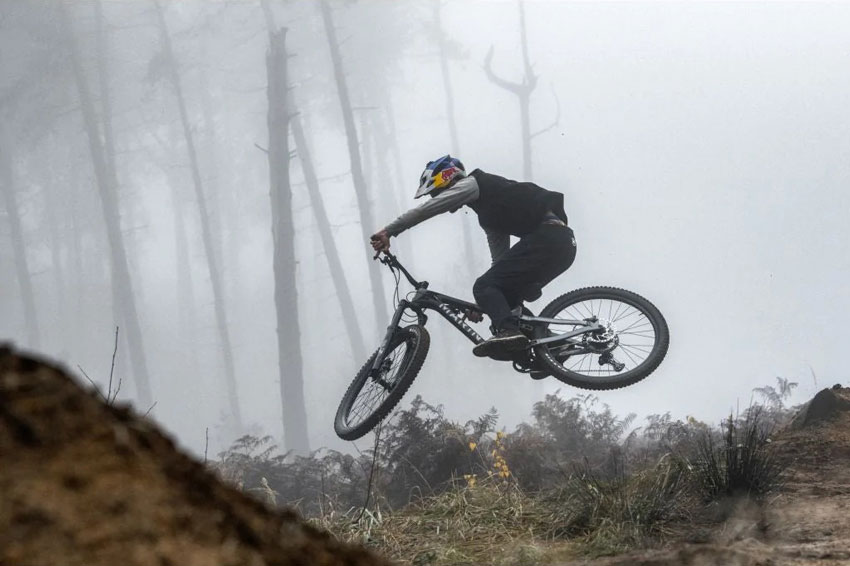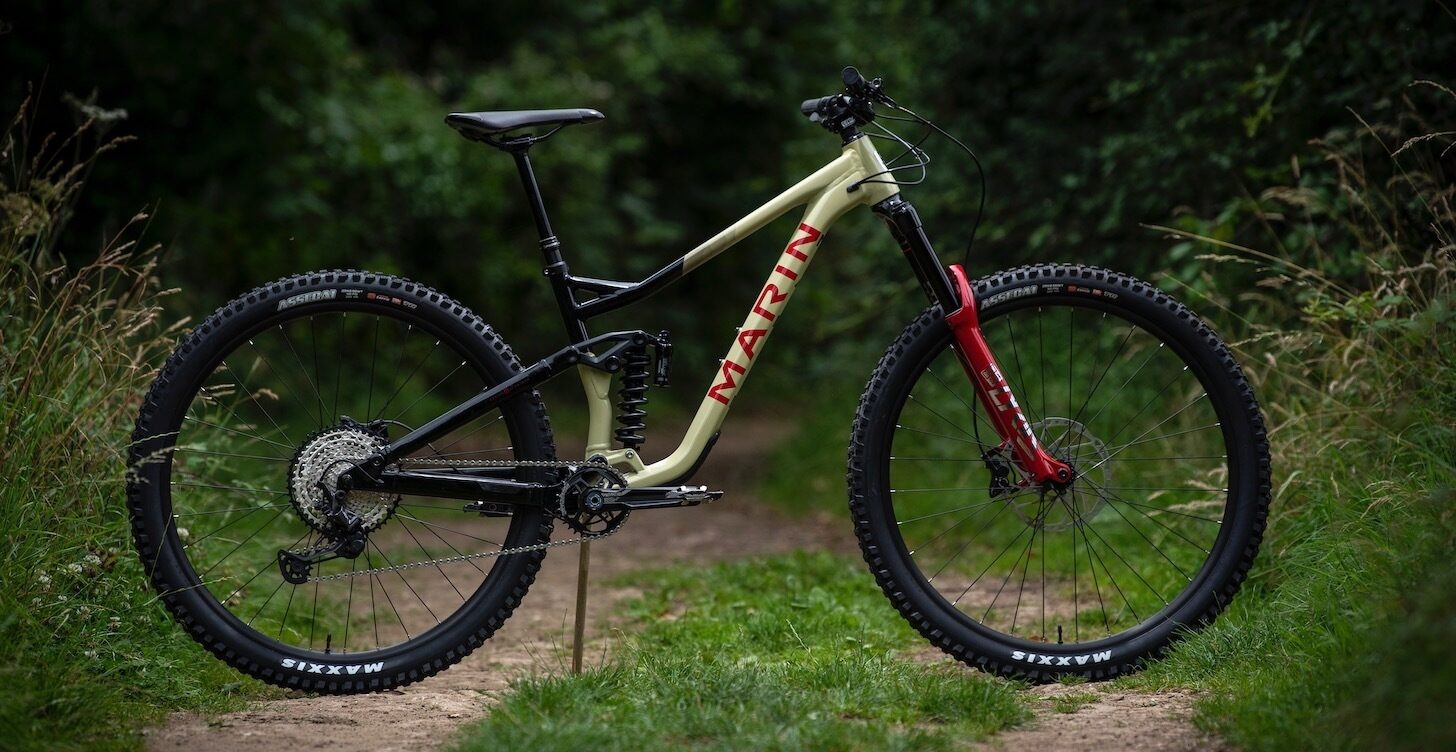Marin Alpine Trail Review — Capable Yet Affordable Enduro Mountain Bike

The Marin Alpine Trail is an aggressive 29er enduro bike designed to be ridden hard on downhill trails.
The series comprises four models, two aluminum and two carbon and aluminum blends. It’s a no-nonsense choice with solid componentry, a quality frame design, and highly competitive pricing.
Modern trail geometry, burly tires, and a smooth MultiTrac suspension platform give the Alpine Trail its monstrous capability on rough descents, perfect for the gravity-focused trail rider who’s not in a rush to get to the top.
This Marin Alpine Trail review will overview the four-bike series, discuss the individual models in detail, and finish with our verdict on who should buy it.
Marin Alpine Trail Main Specs
- Frame: Aluminum or Carbon/Aluminum
- Wheel size: 29″
- Tires: 2.6″ Flow Snap or 2.5″ Maxxis Assegai
- Front travel: 160mm
- Rear travel: 150mm
- Drivetrain: 12-speed
- Brake rotors: 180mm (r), 203mm (f)
- Seatpost: 125mm (S) 150 (M, L) 175mm (XL)
- Weight: 35lbs approx.
Marin Alpine Trail Overview
The Marin Alpine Trail is one of the biggest bargains in the mountain bike market.
The frame design and the key components are solid and reliable across the board. Marin Bikes cleverly saves costs on the less influential parts, including own-brand wheels, bars, and a cheap crankset.
What’s New for the 2023 Marin Alpine Trail
For 2023, Marin re-released all the 2022 Alpine Trail models except the XR. Their intention may be to allow the XR model to sell out and discontinue its production for 2023.
The only difference in spec for 2023 comes on the Alpine Trail Carbon 2, switching the rear shock to a Fox Float X Performance from a Fox Float DPX2 Performance.
The 2022 Float X is Fox’s replacement for the DPX2 and is a higher-performing fork that is more supportive and stays higher in the travel. Otherwise, all of the Alpine Trail models remain unchanged for 2023.
Aluminum and Carbon Frames
The Marin Alpine Trail frame comes in two different constructions, a full Series 4 aluminum (XR and 7) and a carbon/aluminum combination (Carbon 1, 2).
The Series 4 aluminum is Marin’s highest grade and has sleek polished welds, double and triple-butted tubing, and solid ride characteristics.

The Carbon models use a Series 4 alloy rear end paired with a unidirectional carbon fiber front triangle to deliver improved stiffness and strength-to-weight characteristics.
All frames have a downtube protector, chainstay guard, and sleek internal cable routing that help the Alpine Trail run quietly and last longer.
Finally, Marin designed the Alpine Trail with a bridgeless seatstay that maximizes tire clearance and makes it possible to use short chainstays without sacrificing stiffness.
Modern Trail Geometry
The Marin Alpine trail has one of the most aggressive takes on modern trail geometry you’ll find, comparable to that of the best enduro mountain bikes with 10 to 20mm more travel.
Each model has a super slack head tube angle of 63.5 degrees and an equally steep 78-degree seat tube angle. Additionally, you have a long wheelbase of 1199 to 1297mm contrasted with relatively short 430mm chainstays across the four sizes.

The slack head tube angle and long wheelbase create a stable and controlled feel when descending at speed, and the steep seat angle balances this out with an efficient and comfortable seated climbing position.
One thing to note when riding a bike with such a slack head angle is that you’ll need to put more weight on the front wheel than on a bike with traditional geo.
The Alpine Trail is undoubtedly designed for fast and aggressive riding. Yet, the short rear end contributes to a more playful ride feel than you’d expect from this style of bike.
MultiTrac Suspension
The MultiTrac suspension design enhances the Alpine Trail’s downhill ability. It improves small bump compliance, mid-stroke support, and bottom-out control, giving the Alpine Trail a more composed, predictable, and capable ride quality.

Given that the Alpine Trail is an enduro bike, Marin utilizes a leverage curve that optimizes control and traction without sacrificing pedaling efficiency.
The new forged one-piece rocker link boosts the MultiTrac design. This link further increases ride control and gives the Alpine Trail a notably smooth feel on demanding terrain.
Marin Alpine Trail Builds
Four Alpine Trail builds are currently available, including two aluminum alloy models and two aluminum-carbon hybrids. There is only a $1,500 gap between the cheapest and the most expensive model at $4,499, making this one of the most affordable enduro bikes on the market.
Marin Alpine Trail 7

MRSP: $2,999
The Marin Alpine Trail 7 is the cheapest of the four, an excellent entry-level enduro bike option.
This build comes with a complete Series 4 aluminum frame with a RockShox Deluxe Select+ DebonAir shock. The fork is a RockShox Yari RC with a 42mm offset and compression and rebound adjustment.
The Trail 7 is the only one with Vee Tire Flow Snap 2.6″ tires. These use Top 40 Compound for extra grip and Enduro Core technology for reinforcement.
Finally, you have a Shimano Deore M6100 12-Speed with BR-MT420 hydraulic discs for the groupset and a budget TranzX dropper post.
Marin Alpine Trail XR

MRSP: $3,999
The XR is the coil shock version of the Alpine Trail, making it an excellent choice for bike park riding, as it will provide more small bump sensitivity and traction for the harshest downhill terrain. The one downside is you sacrifice adjustability.
This model also has a full Series 4 aluminum frame only with much-improved suspension components. These include a RockShox Super Deluxe Coil shock and a RockShox Lyrik Ultimate fork with a Charger 2.1 dampener.
The drivetrain also steps up to a Shimano XT/SLX blend and an FSA Gradient crankset. In addition, the bike comes with one of the best dropper posts for the money—the improved X-Fusion Manic.
Finally, the Marin Alpine Trail XR gets high-end Maxxis Assegai tires with premium Double Down protection in the rear and EXO+ in the front.
Marin Alpine Trail Carbon 1

MRSP: $3,599
The Marin Alpine Trail Carbon 1 has a unidirectional carbon fiber front triangle and aluminum rear triangle combination. Using carbon for most of the frame improves the stiffness-to-weight ratio for superior ride characteristics.
This build reverts to the RockShox Yari RC fork and a Rock Shox Deluxe Select+ RT shock seen on the entry-level model. In addition, it uses the same Shimano Deore groupset and TranzX dropper as the Alpine Trail 7. However, it has upgraded Maxxis Assegai tires.
Marin Alpine Trail Carbon 2

MRSP: $4,499
The top-end Alpine Trail is still affordable for the enduro/trail category. The Carbon 2 uses the same carbon-aluminum combination for the frame.
The major upgrade for this build is the suspension. It includes a Fox Float X Performance EVOL shock paired with a Fox 38 Performance Elite fork, providing much-improved performance over the cheaper models.
Finally, the Carbon 2 uses the same XT/SLX drivetrain as the XR, except with SLX brakes for much improved braking performance over the other three models.
How Does the Marin Alpine Trail Perform on the Trails?
As we’ve seen, the Marin Alpine Trail is a burly 29er enduro bike with arguably the best value for money in the category. This specialist bike excels on downhill terrain with tight corners and big obstacles, with respectable performance on the climbs.
Where Does the Marin Alpine Trail Thrive?
As a 29″ light enduro bike with aggressive geometry, the Alpine Trail easily handles gnarly downhills and is ready to spin slowly up the mountain to do it all again.

The MultiTrac suspension, burly wheels, and modern geometry inspire confidence on fast and technical descents. The Alpine Trail stays composed and planted and absorbs big hits effectively, taking the sting out of rough, rocky sections.
Cornering is one of the Alpine Trail’s stand-out capabilities. A short rear end, low bottom bracket, and tacky tires allow you to rip corners with minimal effort and without knocking off lots of speed.
Another strength of the Alpine Trail is the climbing position created by a 78-degree seat tube angle. This aggressive angle can be a little unusual on flat terrain but makes going up steep climbs feel comfortable, efficient, and natural.
What Can Be Better?
As with most of Marin’s bikes, the Alpine Trail is on the heavier side of the category, weighing roughly 35lbs. This extra weight means it is a little more cumbersome than the competition, although it’s also much cheaper than most.
The highly active suspension reduces pedaling efficiency, compounded by the slightly heavier build. We recommend using the compression lever on the shock to improve climbing ability and reduce pedal bob.
On all but the Alpine Trail Carbon 2, the basic brakes and long brake levers leave a little to be desired. Shimano’s M4100s aren’t as consistent or powerful as you’d want for enduro riding. If you’re planning on making upgrades, consider a higher-end Shimano brake.
Marin Alpine Trail Sizing
The Marin Alpine Trail frame is available in four sizes, S to XL, fitting riders from 5’3″ to 6’4″.
- S – 5’3″ to 5’6″
- M – 5’6″ to 5’9″
- L – 5’9″ to 6′
- XL – 6′ to 6’4″
If possible, riders that fall between two sizes should test-ride the two models at a local Marin dealer or compare the geometry of the two models to a similar bike you’ve ridden.
Bottom Line: Should You Buy a Marin Alpine Trail

The Marin Alpine Trail is a serious bargain, regardless of the chosen build. It would make the perfect first enduro bike for mountain bikers looking to apply their skills to more aggressive and challenging terrain.
The stable geometry, grippy tires, and supportive suspension allow you to handle anything the trail throws your way. In addition, the Alpine Trail provides a solid base for future upgrades thanks to the high-quality frame.
If you’re in the market for an enduro bike with well-rounded characteristics and an affordable price tag, look no further than Marin’s Alpine Trail.
Buy from Jenson USA Buy from GovVelo.com


